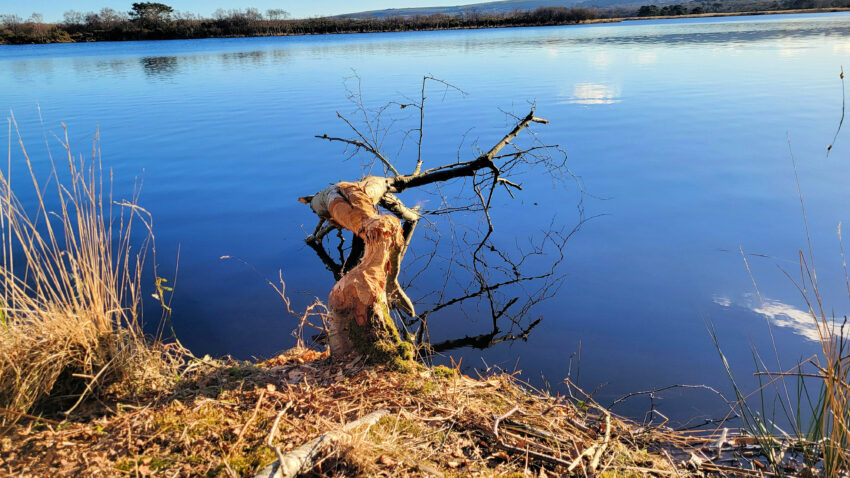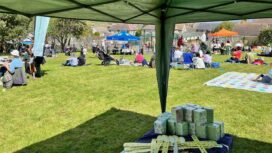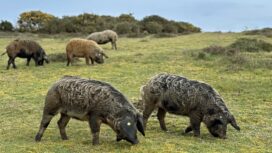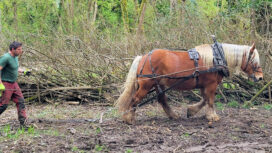Evidence has been discovered indicating that Studland in Dorset has been ‘beaver bombed’ – the intentional and unsanctioned release of beavers into the wild, in defiance of government policy.
The National Trust, which owns the land around Little Sea in Studland, says that any beavers now in the area are not part of its planned programme, which it has spent years urging the government to approve. It looks likely that undercover wildlife warriors have now taken matters into their own hands.
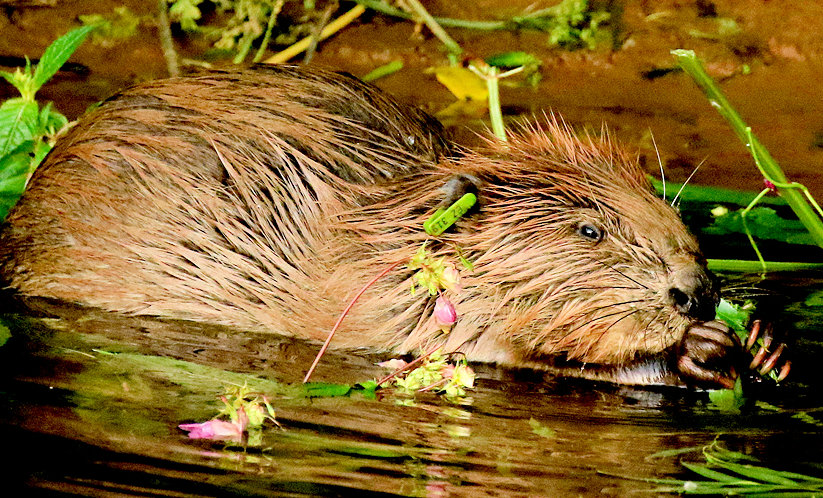
Beavers, like this one on the River Otter in Devon, have now become part of Studland’s fauna
Trees by the lake chewed and felled
The illegal release of wildlife like beavers carries a maximum punishment of two years in jail and an unlimited fine for anyone who is successfully prosecuted.
While it is possible that the beavers made their own way to Studland, it is thought highly unlikely.
So far no beavers have been spotted but trees along the freshwater inland lake have been heavily gnawed, including one which has been almost chewed through and has now fallen into the water. Privately, experts are saying there is little doubt that the activity is evidence of beavers.
The National Trust has deployed a series of trail cams to keep an eye out for the new beavers, and it is keeping an open mind about microchipping them, as it had planned to do with its own beavers.
A National Trust spokesperson said:
“We are aware of evidence which suggests that beavers have potentially ‘moved in’ to Little Sea in Studland. Through feasibility studies we know this site is highly suitable for beavers, but we did not introduce them.
“We have been working closely with Natural England for the past six years to develop an approach for a licensed release of wild beavers in this area. We are currently working with Natural England and other partners to determine next steps.”

The heavily gnawed tree by Little Sea is evidence of the illegal migrants
“There is no requirement to remove them”
Despite the surprise discovery, the National Trust is still keen to gain a licence for the wild release of three breeding pairs of beavers into the unenclosed area.
Ben McCarthy, head of nature and restoration ecology at the National Trust said:
“We know thanks to our previous licensed reintroductions of beavers at other National Trust sites that they are a conservation success story and contribute massively to targets for nature recovery.
“Having beavers at Little Sea will undoubtedly support the Purbeck Heaths Super National Nature Reserve and only be a good thing for building further resilience into the landscape to benefit this special habitat and other wildlife.
“We don’t know how the beavers got to Little Sea – they are already colonising waterways across Dorset so they could have got there by natural dispersal, or it could have been an unauthorised release.
“But as beavers are a native species, there is no requirement to remove them from Little Sea. Our recent assessment into the feasibility of reintroducing them there concluded it was highly suitable, and we had planned to release them once we had a licence for a wild release from Defra.
“Many species benefit from the habitats that beavers create and there is also evidence that they can play a role in helping manage flood risk, help with drought resilience and improve water quality.”

Beaver cams in the woods around Little Sea could soon stream online pictures to the public
Beaver cams may be set up for remote access
The public is being specifically asked not to go looking for the beavers, because of the risk of disturbance, and instead the National Trust is considering setting up beaver cams to allow remote access for everyone.
Beavers are a native species which were hunted to extinction about 400 years ago, but there has been a determined effort in the past decade to restore them to the English landscape.
The rodents create their own wetlands and bring wildlife back to the landscape as they do so. Their dams slow the flow of water in rivers, reducing the risk of flooding downstream, while the wetlands they create are one of the best ways to capture carbon.

Beaver activity is already evident in places as the pair make themselves at home
Eco tourism driven by rare species
Reintroducing rare wildlife can transform rural economies. Purbeck has already seen national and international interest in its sea eagles, ospreys and seahorses, and in time, beaver eco tourism may also help support local businesses and create new jobs.
Former Prime Minister Boris Johnson said in 2021 that the UK would ‘build back beaver’ and gave Defra, the Department for the Environment, Food and Rural Affairs, a brief to research and reintroduce extinct species to the UK. The animals were given official protected status in October 2022.
Controlled trials of beaver releases, including one in Devon, proved very effective in managing river courses which retained water in the landscape, prevented flooding and had an unexpected benefit of helping endangered water voles to thrive.
But a fact finding hearing at the palace of Westminster in January 2023 was distracted by calls to reintroduce lynx and wolves to the UK alongside beavers, which introduced voices of opposition.

Little Sea extends over 33 hectares, to the southernmost point close to Knoll Beach
“There are more important things than beavers”
It led to the then Environment Secretary Therese Coffey telling a conference of the National Farmers’ Union:
“I don’t want farmers to constantly have to worry about these issues. We’ve got plenty to do with the habitats that need improving and expanding. That is why I won’t be supporting reintroductions of species like lynxes and wolves. We just don’t need to and we won’t.”
In June 2023, she shelved plans to reintroduce beavers, saying they were not essential to meeting global biodiversity targets and adding:
“For what it’s worth, I think there are more important things than beavers.”
The Defra committee spent months hearing evidence from scientists, farmers, conservationists and government officials before recommending ministers publish a list of priority species for reintroduction and create an online hub with advice and best practices.
But in October 2023, the government announced that it would not create such a list ‘given that reintroduction is not a priority’, and said it preferred to focus on habitats.

Little Sea, an inland freshwater lake, was created after sand dunes cut it off from the sea
Little Sea a ‘perfect habitat’ for beavers
Little Sea is said to be a perfect habitat for beavers with deep, fresh water, wood for dam building and plenty of young tree growth and water plants to feed on – beavers are herbivores and don’t catch or eat fish.
The 33 hectare site is large enough to support several beaver family groups, and as they only have two to four young a year, they are unlikely to spread out of the area – which, in any case, has the sea and Poole Harbour on three sides.
To date, the National Trust has only carried out three enclosed beaver releases, the first on Exmoor in Devon in 2020, which proved a great success. The proposed application for Purbeck is for an unenclosed or ‘wild’ release.

Beavers are a keystone species which could bring a whole raft of ecological benefits to Studland
No one has yet claimed responsibility
No one has yet come forward to claim responsibility for releasing the Studland animals, although beaver bombing has become a recognised strategy for wildlife groups who have lost patience with governments stalling on the issue.
The most famous was Olivier Rubbers, a Belgian who borrowed his father’s car and drove into Germany to buy beavers and let them free in rivers across his own country.
He released 97 in Belgium before the authorities caught up with him and fined him 500 Euros for detaining and transporting a protected species, but he has since watched with satisfaction as the beavers spread across Belgium, transforming its waterways.
Frogs and fish came to lay their spawn in the slowed, dammed up water, while bugs and beetles thrived in the rotting wood of the felled trees and birds followed in their wake, feeding off the fish and insects.

Down by the lake’s edge at Little Sea, animals have clearly been beavering away
Further information
- Find out about the National Trust’s scheme to reintroduce beavers to Studland on its website
